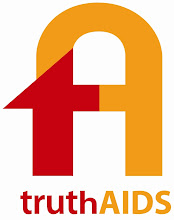There was great article posted last week from the Senior Vice President of the Robert Wood Johnson Foundation on the importance of place and context in the health. TruthAIDS supporters you know the story but just in case you missed this article. Check it out below:
Why Your ZIP Code May Be More Important to Your Health Than Your Genetic Code
This commentary by James Marks, M.D., M.P.H., originally appeared April 23, 2009, on The Huffington Post.How you see a problem drives how you create the solution.
We are not a healthy country. And while health reform focuses on coverage, cost, access and care, this is simply triage to a system that fails to ask the question "Why aren't we healthier in the first place?" Our health reform debate is focusing on where health ends (with medical care) and not on where our health begins (where we live, learn, work and play).
This month, the Robert Wood Johnson Foundation Commission to Build a Healthier America released a report about all of those other things. This report comes out of a bi-partisan commission created to look at the factors that affect Americans' health in our homes, our work environments, and our communities. In wonky terms, we call these factors "social determinants of health." In plain English, the Commission's purpose was to look for ways beyond medical care that could improve our health.
What do we mean by "beyond medical care?" There is a ton of evidence that shows where and how people live, learn, work and play has a tremendous impact on our health. And while this link may seem intuitive to most, the extent of the relationship is not reflected in either the way we consider our own health or the way we go about creating solutions to make us a healthier nation as a whole.
Let us consider just a few facts:
*
Evidence now suggests that medical care accounts for only 10 to 15 percent of preventable early deaths.
*
Some Americans will die 20 years earlier than others who live just a few miles away because of differences in education, income, race, ethnicity and where and how they live.
*
College graduates can expect to live five years longer than those who do not complete high school.
*
Middle-income people can expect to live shorter lives than higher income people, even if they are insured.
*
And people who are poor are three times more like to suffer physical limitations from a chronic illness.
In other words, as it relates to our health, our ZIP code may be more important than our genetic code, our school files may be more telling than our medical files, the time spent in our office at work may be more relevant than the time spent at our doctor's office and the places we play may be more crucial than those where we get treated.
Even when we do consider these social factors, we too often place an unfair burden on personal responsibility and ignore the obstacles that stand in the way for some to make healthier choices. Consider that Detroit, an area of 139 square miles and over 900,000 citizens has just five grocery stores. An apple a day may help keep the doctor away but that assumes you can find an apple in your neighborhood.
As we begin to explore new ways to improve this country's health, we should look for inspiration from innovative programs around the country that are finding sensible, sustainable solutions at the intersection of health and daily life.
Take for example a program like Bonnie CLAC (Car Loans and Counseling), which is built on the premise that how you get around affects your ability to live a healthier lifestyle. Reliable transportation can mean the difference between keeping and losing your job, being able to take your kids to the doctor and make it to a grocery store that sells healthier food. Bonnie CLAC is helping the working poor purchase fuel-efficient cars at great prices and low interest rates, while providing them with crucial financial counseling. This counseling not only helps them make the payments but also show how changes, like quitting smoking, can help their financial bottom line and be good for their health. If only our banks had taken a similarly responsible approach to home lending, we could have avoided the sub-prime mess that has had a devastating domino effect in creating more Americans who are vulnerable to financial difficulties and subsequent poor health.
As we consider health reform in 2009, let's think about the neighborhoods and towns in which we all live, and ask ourselves: What are the barriers standing in the way to better health and how can health reform change the places we spend our lives to make them healthier places in which to live?
Take a look around you and ask yourself "where does health really start?" Is it in the hospital or the home? Is it with insurance company or your employer? Is it with an ambulance driver or an urban planner?
Only when we answer these questions honestly and see our health problems more clearly in this broader context, will we begin the real work to create and invest in solutions that help us all live as long and as healthy as we can.
James Marks, M.D., M.P.H., is currently the senior vice president, director of the Health Group at the Robert Wood Johnson Foundation and is former assistant surgeon general, director of the Centers for Disease Control's National Center for Chronic Disease Prevention and Health Promotion.

